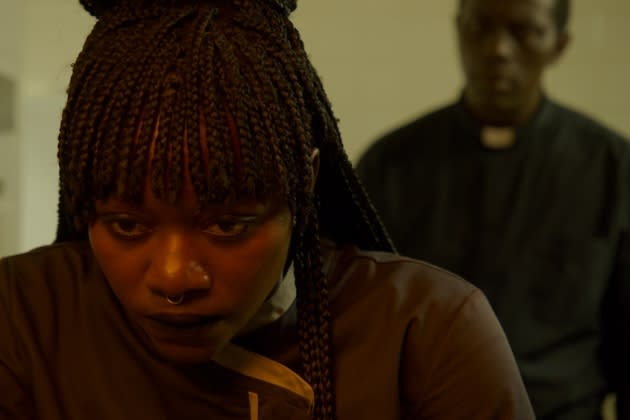‘Our Father, the Devil’ Review: Past Is Prologue in Ellie Foumbi’s Promising Debut Feature

If the title “Our Father, the Devil” rings a bell, that’s probably because the previously under-the-radar Franco-American co-production received a Spirit Award nomination for best feature in late 2022. Ellie Foumbi’s debut feature premiered a few months earlier at the Venice Film Festival and is still seeking U.S. distribution. While calling it one of the best films of the year seems a bit much, there’s no denying it’s worthy of attention. A cutting, at times unwieldy exploration of trauma and forgiveness, the enigmatic drama goes places you almost certainly won’t expect — and, once there, makes you wonder how you ever thought it could have gone anywhere else.
Marie (an excellent Babetida Sadjo) is the head chef at an upscale retirement home in the south of France, a swankier gig than it might sound like — after serving duck confit to a discerning resident one day, she learns that the woman has just updated her will to include Marie. The first sign that all is not well despite what appears to be a contented existence comes early, in a blink-and-you’ll-miss-it scene as Marie changes one night. The room she’s in is dimly lit, but we’re still able to see strange marks just below her shoulder — circular scars that look a bit like the results of cupping. Foumbi’s camera doesn’t linger on them, but it’s difficult not to think about that scar tissue when, just minutes later, the sight of a newly arrived African priest (Souléymane Sy Savané) delivering a sermon at the retirement home causes Marie to faint.
More from Variety
'Pachinko' Wins Ensemble Cast Award as Independent Spirit TV Nominations Are Announced
As More Awards Shows Go Gender-Neutral, Will Major Ceremonies Follow?
At first, this man of the cloth is framed from the neck down, meaning we see his collar but not his face as he ruminates on the difficulties of living up to God’s example as imperfect beings. Marie approaches the room he and his makeshift congregation are in slowly, as if the mere sound of his voice is setting off alarm bells in her head while she makes her way down the hall; before she passes out, the camera zooms in on her face as tears form at the corner of her eyes. It’s a corker of a scene, one that makes it clear these two figures are connected by more than the fact that they both came to France from Africa.
The thing about the past is that it often finds its way into the present. Father Patrick, as this man is calling himself, would appear to be proof of this. In small, seemingly innocuous acts — coming into Marie’s kitchen after hours to ask for more soup, for instance — he’s exercising power and making it impossible for her to move on, though we don’t know from what. “Our Father, the Devil” takes a hard right turn before the two have formally acknowledged one another, leaving open the possibility that either Father Patrick genuinely doesn’t remember Marie or that they’ve actually never met. She’s so fraught every time she’s in his presence that we can’t be sure — at least not at first.
“Our Father, the Devil” thrives in that uncertainty, which is why it’s disappointing when Foumbi abandons it in favor of a definitive answer as to whether Marie and Father Patrick do indeed know each other. Just as Marie’s attempts to keep this part of herself and her past separate from the rest of her life don’t always succeed, neither do the film’s — it’s hard to convey the tonal oddity of going from an incredibly intense sequence between Marie and Father Patrick to a completely different sex scene accompanied by a conventionally romantic soundtrack, but at least the rest of the film isn’t so disjointed.
“We’re dark souls,” Marie’s elderly benefactor tells her as they go for a stroll one day. “That’s why we get along so well.” They’re far from the only ones that description applies to in Foumbi’s film, which brings to mind a line from Cormac McCarthy’s “No Country for Old Men”: “You think when you wake up in the mornin yesterday don’t count. But yesterday is all that does count. What else is there? Your life is made out of the days it’s made out of. Nothin else.” Marie would surely agree, and her struggle to move on from her yesterdays is as courageous as it is tragic.
Best of Variety
Sign up for Variety’s Newsletter. For the latest news, follow us on Facebook, Twitter, and Instagram.
